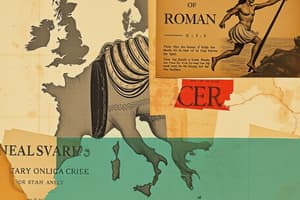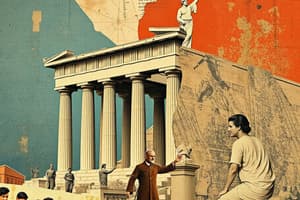Podcast
Questions and Answers
What was one significant outcome of the Crusades?
What was one significant outcome of the Crusades?
- They introduced the concept of feudalism to the Middle East.
- They boosted trade between Europe and Asia. (correct)
- They significantly weakened the Catholic Church.
- They successfully recaptured Palestine.
Which statement best describes the political structure of the Roman Republic?
Which statement best describes the political structure of the Roman Republic?
- Citizens elected representatives to make decisions. (correct)
- Officials were appointed by nobles.
- A single ruler held absolute power.
- Citizens voted on every issue directly.
What role did the Catholic Church play during the Middle Ages?
What role did the Catholic Church play during the Middle Ages?
- It facilitated the establishment of direct democracy.
- It led to the decline of feudalism.
- It created a unified spiritual and social structure. (correct)
- It solely focused on spreading military influence.
What was primarily responsible for the decline of feudalism?
What was primarily responsible for the decline of feudalism?
Which ancient Greek philosopher is known for writing 'The Republic'?
Which ancient Greek philosopher is known for writing 'The Republic'?
What significant change occurred in Europe around the year 1000?
What significant change occurred in Europe around the year 1000?
Who were vassals in the feudal system?
Who were vassals in the feudal system?
What did Marco Polo's journey to China contribute to European knowledge?
What did Marco Polo's journey to China contribute to European knowledge?
Which idea did Aristotle promote in his philosophy?
Which idea did Aristotle promote in his philosophy?
What was a significant social structure that emerged during the Middle Ages?
What was a significant social structure that emerged during the Middle Ages?
How did the Crusades primarily affect trade?
How did the Crusades primarily affect trade?
What role did the Catholic Church play during the Middle Ages?
What role did the Catholic Church play during the Middle Ages?
What was one consequence of the Black Death in Europe?
What was one consequence of the Black Death in Europe?
What geographical area did the Franks conquer in the 480s?
What geographical area did the Franks conquer in the 480s?
Which government structure is characterized by citizens electing representatives?
Which government structure is characterized by citizens electing representatives?
What was one effect of Marco Polo's journey to China?
What was one effect of Marco Polo's journey to China?
What major political change did the Roman Republic undergo?
What major political change did the Roman Republic undergo?
What was the manorial system primarily based on?
What was the manorial system primarily based on?
Study Notes
Ancient Greece
- Socrates: Encouraged deep thinking and questioning.
- Plato: Wrote The Republic, describing a fair society.
- Aristotle: Promoted reason and logical thinking.
- Greek Legacy: Advanced in geometry, calculated Earth's size, invented tools like the water screw, and introduced direct democracy.
- Direct Democracy: All male citizens voted on laws in Athens.
Ancient Rome
- Roman Republic: Citizens initially elected officials to rule, and later developed a government with three parts.
- Roman Law: Promoted equality and applied the principle of "innocent until proven guilty".
Influence of Ancient Greece and Rome
- Legacy in Government: Greek and Roman ideas shaped the democratic republic of the U.S. government.
The Middle Ages
- Timeline: Lasted for about 1,000 years, beginning in the 500s.
- The Fall of the Roman Empire: The Roman Empire fell in the 400s.
- Division of Europe: Europe was divided into small kingdoms by the 500s.
Feudalism
- Frankish Conquest: Franks conquered Gaul (now France) in the 480s.
- Rise of Nobles: As kings became weaker, nobles gained power.
- Lords and Knights: Lords gave land to knights in exchange for military service.
- Vassals: Knights who supported lords in battle.
- Feudalism: System of promises between lords and vassals.
The Manorial System
- Manors: Knights' estates where peasants worked.
- Peasant Payments: Peasants gave food or goods as payment for working on manors.
- Role of the Church: The Catholic Church provided unity during the Middle Ages, and life revolved around the local church.
The Crusades
- Series of Wars: A series of wars between European Christians and Muslims.
- Goal: To recapture Palestine from the Turks.
- Impact: Crusades ultimately failed but spurred trade between Europe and Asia, introducing Europeans to new products and ideas.
Travel, Trade, and Towns
- Increased Food Production: After 1000, increased food production led to population growth.
- Trade Expansion: Safer travel allowed merchants to trade across Europe and Asia.
- Marco Polo: His journey to China spread stories of spices and paper money.
- The Black Death: Trade routes also brought the Black Death, killing 25 million people.
Decline of Feudalism
- Labor Shortage: The Black Death led to a labor shortage, allowing peasants to demand wages.
Ancient Greece
- Socrates encouraged deep thinking and questioning.
- Plato wrote The Republic, describing a fair society.
- Aristotle promoted reason and logical thinking.
- Greek Legacy - Advanced in geometry, calculated Earth’s size, and invented tools like the water screw.
- Athens introduced direct democracy where all male citizens voted on laws.
Ancient Rome
- Roman Republic: Citizens elected officials to rule; later developed a government with three parts.
- Roman Law: Promoted equality and “innocent until proven guilty.”
Types of Government
- Direct Democracy: Citizens vote on every issue.
- Republic: Citizens elect representatives to vote for them.
- Influence: Greek and Roman ideas shaped the democratic republic of the U.S. Government
The Middle Ages
- Roman Empire fell in the 400s.
- By 500s, Europe was divided into small kingdoms.
- The Middle Ages lasted for about 1,000 years.
Feudalism
- Franks conquered Gaul (now France) in the 480s.
- Nobles gained power as kings became weaker.
- Lords gave land to knights in exchange for military service.
- Vassals: knights who supported lords in battle.
- Feudalism: System of promises between lords and vassals.
Manorial System
- Peasants worked on knights’ estates, called manors.
- In exchange, peasants gave food or goods as payment.
- Catholic Church unified people during the Middle Ages.
- Life revolved around the local church.
The Crusades
- Series of wars between European Christians and Muslims (1000s).
- Goal: to recapture Palestine from the Turks.
- Failed, but boosted trade between Europe and Asia.
- Europeans were introduced to new products and ideas.
Travel, Trade, and Towns
- After 1000, increased food production led to population growth.
- Safer travel allowed merchants to trade across Europe and Asia.
- Marco Polo’s journey to China spread stories of spices and paper money.
- Trade routes also brought the Black Death, killing 25 million people.
Decline of Feudalism
- Black Death led to a labor shortage, allowing peasants to demand wages.
Studying That Suits You
Use AI to generate personalized quizzes and flashcards to suit your learning preferences.
Related Documents
Description
Explore the key philosophies and contributions of Ancient Greece and Rome. This quiz covers figures like Socrates, Plato, and Aristotle, as well as the influence of their governance structures on modern democracy. Understand the transition to the Middle Ages and the impact of the fall of the Roman Empire.




